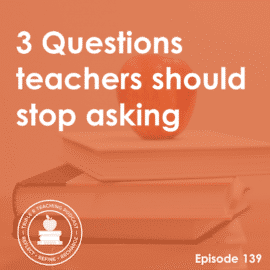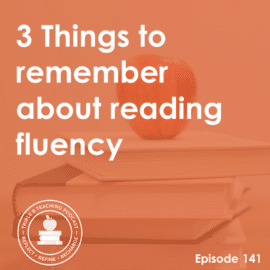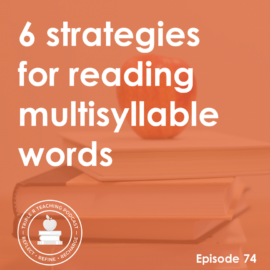
TRT Podcast#4: What did the National Reading Panel say about teaching phonics?
“Phonics” may be the most controversial word in the history of teaching reading! What does the research actually say? Today we’ll look at what the National Reading Panel said (and didn’t say) about the teaching of phonics.
Listen to the full episode
Full episode transcript
Phonics may be the most polarizing word in the history of teaching reading. Something about that word brings up so many strong feelings. Sometimes it's good to just take a deep breath and see what the research really has to say about teaching phonics.
It actually says less than you'd think, but what it does say is critically important. Stay tuned for what the national reading panel had to say about teaching phonics.
As you know, phonics is about the relationship between letters and sounds. It includes the teaching of letter sounds and decoding of words. It's not the entirety of reading instruction, but it's critically important because it gives us access to individual words.
The National Reading Panel examined the impact of systematic phonics instruction. Systematic phonics instruction has a plan. It often involves teaching phonics with a program. It includes a clear, well-thought-out scope and sequence, which orders skills from simple to more complex. Systematic phonics is not haphazard, sporadic, or as-needed. It's not just-in-time lessons, only giving children what they need when they need it.
This is what the National Reading Panel went out to discover, is systematic phonics instruction superior to unsystematic or no phonics instruction?
The National Reading Panel was not trying to find out if a particular phonics program was superior or whether it's beneficial for students to learn six syllable types or syllable division. They simply wanted to know, is systematic phonics instruction superior to that which is not systematic or non-existent?
Well, the results of their meta-analysis were probably what you would expect. Systematic phonics instruction makes a bigger contribution to children's growth in reading than alternative programs with unsystematic or no phonics instruction. According to Timothy Shanahan's follow-up article, which I'll link to in the show notes, "Although phonics instruction that was not systematic was better than no phonics instruction, it was not as effective as systematic phonics programs, perhaps because it is too difficult to juggle this amount of individual diagnosis, teaching, and review within the demands of a regular classroom."
The research did not find that specific systematic phonics programs were better than others. Also, despite what you may hear, the National Reading Panel did not find a difference in effectiveness between synthetic and analytic phonics. Synthetic phonics is probably what most programs use, when you sound out words from left to right. Analytic phonics is more of a word family approach. To me, logically, synthetic phonics makes the most sense, and it's perfectly fine to use research and your logic to make decisions, but the research doesn't tell us that synthetic phonics is superior.
The National Reading Panel also found that systematic phonics instruction was effective when taught one-on-one, in a whole group, or in small groups.
It found that phonics instruction produces the biggest impact on growth in reading when it begins in kindergarten or first grade.
Systematic phonics instruction is significantly more effective than non-phonics instruction in helping prevent reading difficulties among at-risk students and in disabled readers.
And, most fascinating of all, growth in reading comprehension was also boosted by systematic phonics instruction for younger students and reading disabled students. "These findings should dispel any belief that teaching phonics systematically to young children interferes with their ability to read and comprehend text. Quite the opposite is the case."
I just find that really interesting because a lot of people are concerned that having students do a lot of phonics work at the beginning of their reading journey is going to squash comprehension. That was a concern that I had, but what we're learning is that that's actually not true. In fact, the opposite is true.
Finally, systematic phonics instruction is beneficial to students regardless of their socioeconomic status.
Now, here's a caveat from the report. "The goals of phonics instruction are to provide children with some key knowledge and skills, and to ensure that they know how to apply this knowledge in their reading and writing. Phonics teaching is a means to an end. Educators must keep the end in mind and ensure that children understand the purpose of learning letter sounds and are able to apply their skills in their daily reading and writing activities."
That's it! Does that surprise you, the limited things that the panel found out about teaching phonics from the research? You may have been hoping to find out which phonics program is superior, what scope and sequence you should use, or how you should teach students to read multisyllable words. Those things are not as clear as we'd like them to be.
Steven Dykstra has given a presentation about bullseye science. There are some things we know absolutely for sure, they're in the bullseye of the target. We know that phonemic awareness is necessary for learning to read. We know that systematic phonics instruction is superior to haphazard phonics instruction. Beyond that, there's not a lot more we can say with 100% certainty. But don't despair. As a teacher, you can use what the research does tell us and your best judgment to make instructional decisions.
You can find the show notes for this episode at themeasuredmom.com/episode4.
Sign up to receive email updates
Enter your name and email address below and I'll send you periodic updates about the podcast.
Update: Articles related to synthetic phonics
- S. (2020). A 2020 perspective on research findings on alphabetics (phoneme awareness and phonics): Implications for instruction. The Reading League Journal. September/October, 20-28.
- Christiansen, C. & Bowey, J. (2005). The efficacy of orthographic rime, grapheme-phoneme correspondence and implicit phonics approaches to teaching decoding skills. Scientific Studies of Reading, 94(4), 327-349.
Related links
- The National Reading Panel Report: Practical Advice for Teachers, by Timothy Shanahan
- National Reading Panel’s report
Free CVC Word Decodable Books!
Join our email list and get these 3 CVC word decodable books for FREE!








Leave a Comment